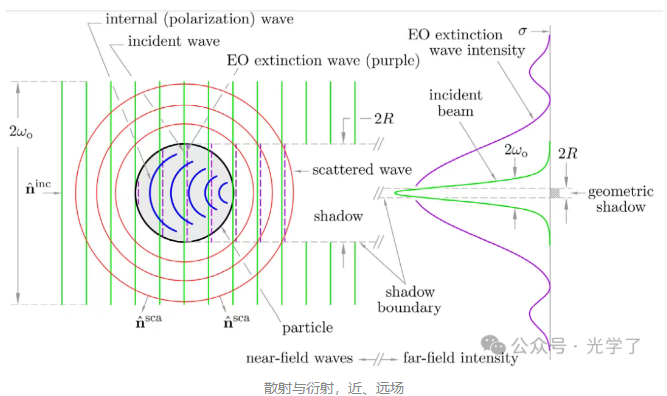Chongfan Technology
News
24
2025
-
07
Scattering and diffraction
Author:
This is a very good question. Often, these two concepts are confused. Here, I will only offer some personal, superficial understandings regarding electromagnetic waves This is a very good question. Often, these two concepts are confused. Here, I will only offer some personal, superficial understandings
Scattering and Diffraction share some commonalities. At least, when describing their concepts or imagining their physical images, both physical processes involve changing the original propagation direction of electromagnetic waves 。
They have many commonalities, but also many differences. Generally, it is considered that scattering is an incoherent process while diffraction is a coherent process . This seems quite clear. When discussing diffraction, we always cannot avoid interference, but when discussing scattering, we rarely discuss interference. This is evident from their mathematical expressions; the description of the diffraction process starts from the perspective of waves, while the description of scattering often considers particle or wave properties.

Besides the above perspectives from waves or particles, or from coherent or incoherent processes, I once saw a sentence, but I have forgotten the source. The general meaning is: " Diffraction is the macroscopic manifestation of microscopic scattering." ”
I think this sentence makes a lot of sense. Scattering is generally considered to be the change in the propagation direction of electromagnetic waves at the discontinuity of the refractive index of the material . Generally, different types of scattering are classified according to the size of the discontinuous medium. In short, according to the previous sentence, it can be considered that when propagating electromagnetic waves encounter a region with non-uniform refractive index, for example, when encountering particles , causing the electromagnetic waves to propagate in all directions , this is the basic meaning of scattering. If these scatterings form a specific constructive interference, for example, when electromagnetic waves encounter periodically arranged particles , these scattering behaviors interfere constructively, forming diffraction in a specific direction . This better explains "Diffraction is the macroscopic manifestation of microscopic scattering." The illustrations in the literature of near-field and far-field scattering and diffraction are consistent with the above ideas.
LATEST NEWS
2025-08-20
High-order vortex beams assist super-resolution imaging
Recently, Professor Huang Zhiwei from the Department of Biomedical Engineering at the National University of Singapore led a biophotonics team in a latest study proposing that by introducing higher-order vortex beams into the minimal light flux (MINFLUX) imaging technology, the measurement accuracy of the imaging system can be significantly improved, thereby further breaking through the resolution limits of traditional optical imaging.
2025-08-20
Intrinsic Higher-Order Topological Insulators Based on Equivalent Medium Systems
Recently, Dr. Shaojie Ma, a young researcher at the Fudan University Institute of Future Information Innovation, Professor Lei Zhou from the Department of Physics, and Professor Shuang Zhang from the Department of Physics at the University of Hong Kong collaborated to achieve breakthrough progress in the field of topological state research, proving for the first time at both theoretical and experimental levels that intrinsic higher-order topological insulators (HOTI) exist in uniform electromagnetic media.
2025-08-20
Research on Non-Hermitian Properties Assisted by Orbital Angular Momentum Synthesis Dimensions
In quantum mechanics, observables usually need to satisfy Hermiticity to ensure that their eigenvalues are real numbers.
2025-08-20
Differentiable imaging unlocks full-link optimization
In the field of computational imaging, uncertainty has long constrained technological development.
2025-08-20
Reconfigurable multifunctional integrated optical computing chip
The development of artificial intelligence is driving the evolution of computing architecture towards higher performance, lower power consumption, and greater adaptability.
Thank you for visiting the official website of Chongfan Technology. If you have cooperation intentions or suggestions, please contact us through the following methods, and we will reply as soon as possible, thank you!
Address: Room 403, Building 6, Phase III of R&D, No. 36 Xiyong Avenue, High tech Zone, Chongqing, China.
Telephone: +86-13658337211
E-mail: Sales@cfkeji.net
Website: www.cfkeji.net
Mobile Version

